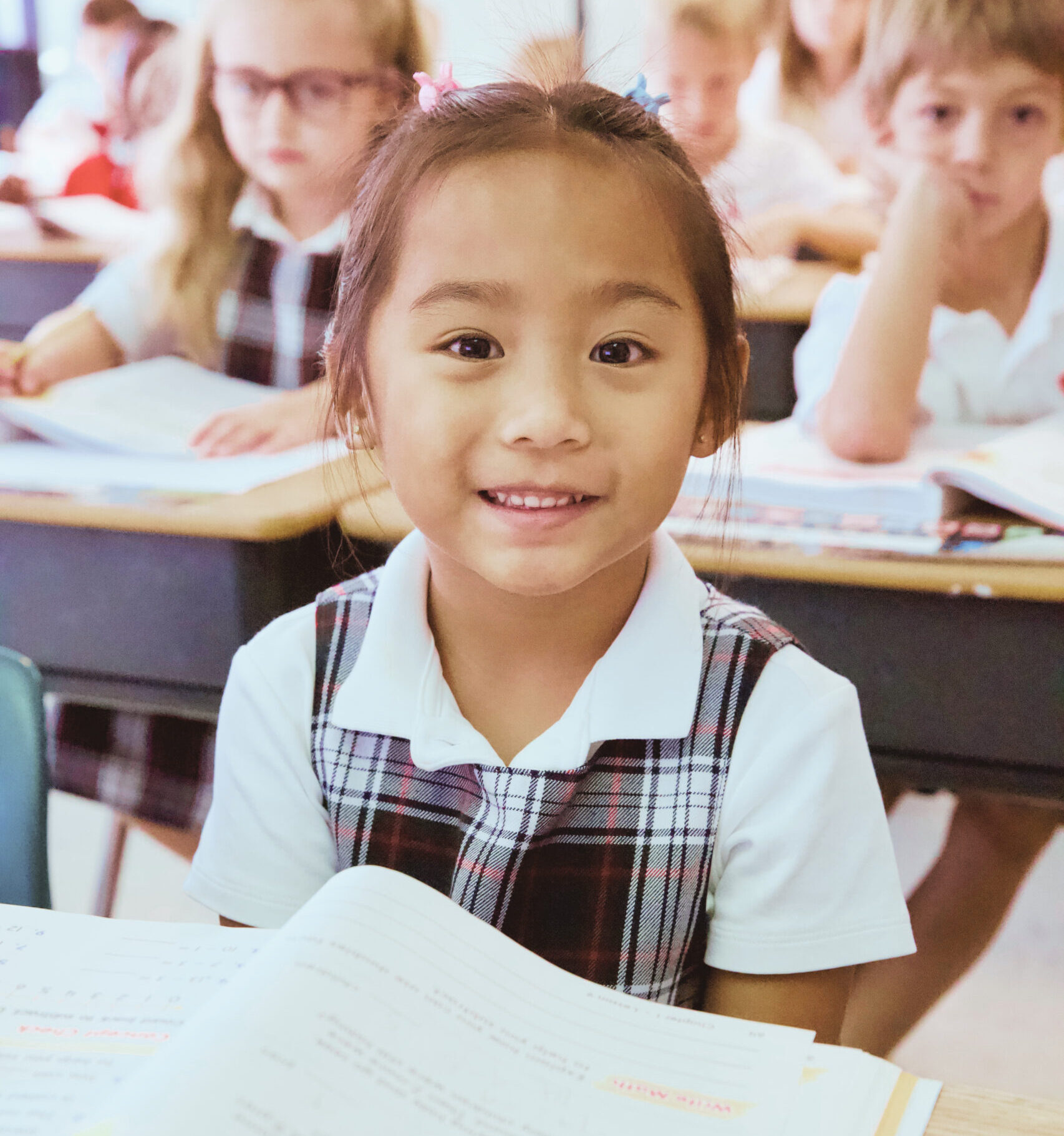Third Grade
The Third Grade bases its curriculum on the guidelines set by the Diocese of Richmond. Using texts, technology, and other resources in each curriculum area, the required skills are taught through a variety of methods and approaches to learning.
The math curriculum begins with a review of number sense skills such as place value, rounding, number order, and comparing numbers. We move into basic addition and subtraction skills of regrouping, estimating a sum or difference, Children learn counting change, making change, telling and using time. Multiplication skills and division are introduced and developed up to the 12 tables. Children learn to use standard and metric measurements in everyday situations. Plane and 3 dimensional figures are reviewed. We end the year with a review of fractions Throughout the children solve word problems, use graphs and charts, and logical thinking skills. Definition of terms is also presented. Use of manipulatives enhance the learning experiences.
Science starts with a study of animals and their habitats. Later children learn about what natural resources are, how we use them, and need to protect them. We explore weather, various forms of energy, and the solar system. Children also learn what simple machines are and how they work. Most science units include opportunities for hands-on exploration of the topics being discussed.
Our reading program covers a variety of genres including fantasy, historical fiction, realistic fiction, folktales, nonfiction, biographies, plays, and poems. We emphasis comprehension, vocabulary development, and making inferences. Students’ needs are met through the use of leveled activities and materials. Students read from the reading text as well as various trade books. Writing is incorporated throughout. Opportunities to do dramatic readings, produce original plays are provided.
Students grow in their understanding of their faith community and develop a deeper understanding of their faith in God and Jesus. They are introduced to the various books of the bible through stories related to the life of Jesus, Mary and the early Jewish men and women of faith. Their knowledge of the mass, the sacraments and the Liturgical year as well as the basic truths about God are deepened. Growing in an understanding of the Catholic Social Teachings is integrated throughout the year.
Our social studies program is based on the Virginia state curriculum. The focus in third grade is learning about the ancient cultures of Greece, Rome, and Mali with an emphasis on their geography, early government, economics, and cultural activities. We move into the study of the European exploration of the new world and the establishment of colonies (especially Jamestown) in American leading to the American Revolution. Students learn about important national documents and the basic structure of the local, state, and federal governments.
English skills include an understanding of the basic grammar structure of the English language and how to use it to build well developed sentences, paragraphs and stories. Children practice these skills in the use of the writing process.
Spelling is taught in a leveled program that emphasizes the phonetic structure of words.
Cursive writing is strengthened through a review of and use of the cursive skills learned in second grade.
Fourth Grade
Fourth grade begins the Intermediate level with greater responsibilities, challenges, and expectations. Students improve their organizational skills through the use of student planners and binders. The children transition between two teachers who follow the Diocesan Consensus Curriculum. Core subjects include math, language arts, science, social studies, and religion as well as resource subjects of music, art, computer, library, drama, physical education, and Spanish.
Math, science, and social studies are taught by one teacher. Fourth grade math is viewed as a foundation year. It is the year to master basic multiplication and division facts. With this mastery, students will explore these operations using larger numbers. Students will also work with decimals, fractions, and geometry. An introduction to algebraic equations and expressions will be explored. Problem solving skills will be an ongoing thread throughout the year with many different types of word problems. Students will also be engaged in small group activities weekly. Students will be challenged to explore numbers and number relations through a variety of fun, small-group activities.
The fourth graders will spend the year exploring our great state of Virginia in social studies classes. Students will begin the year with a study of Virginia geography. Students will then journey through the history of our state. We will discuss the role of Virginia in our nation’s history from Jamestown through the Revolutionary War. We will examine the events that lead to the Civil War and Virginia’s role in the war. We will move through Reconstruction and on to the World Wars. Along the way we will learn about great Virginia men and women who made important contributions. We will conclude by looking at modern Virginia, our government, and our economy. Just for fun, we will also learn all 50 United States and their capitals.
The fourth graders will explore a wide variety of topics in science. Students will study the life sciences through a study of plants and animals. Students will have great fun with earth science. Students will learn about the layers of the earth, earthquakes, and volcanoes. We will examine weather concepts. We will also explore our solar system. The states of matter will be studied. Students are often amazed during our study of energy and magnets. Science labs are a weekly part of our class. Students will work in small groups to conduct labs as well as complete at-home experiments.
Reading, language arts, and religion are taught by the other fourth grade teacher. The children read from a basal reader, discuss new vocabulary, and master focus skills such as: character’s traits and motivation, narrative elements, main idea and details, and conflict and resolution. In addition to learning comprehension strategies before, during, and after they read, the children participate in two Book and Breakfasts. They also complete several book report activities for different genres. Our spelling series corresponds with our reader. The children are responsible to learn their basic twenty words plus the weekly reading and bonus words.
Throughout the year in English class, children focus on the proper usage of parts of speech and mechanics of grammar. The children use the “6 + 1” traits in their creative writing which is taught each month. They write a variety of paragraphs and most weeks children complete a daily review which focuses on editing sentences and keeping their skills fresh. In the second half of the year, the children learn how to write a five-paragraph research report. In the spring, the children participate in the Easter play which is performed for the student body and parents.
In religion class, children learn what Catholics believe about our relationship with God, how sacraments help us celebrate our good choices, rules that guide us in making decisions, and ways to pray. The children participate in a Saints Hall of Fame in which they research a saint, dress up as the saint, and are interviewed by others. Every other week the children learn twelve glossary words which enhance their understanding of their faith.
Our hope is that by the end of the fourth grade year children have developed good organizational skills, strong study habits, and confidence in their abilities. We hope we have fostered a love for learning and have encouraged each child to discover his or her God given gifts and talents.
Fifth Grade
The fifth grade curriculum is fun and challenging, and therefore always subject to change!
In Math, the year begins with the review of the place value system necessary to understand basic operations. This is followed by addition and subtraction of numbers and decimals. Math properties are fun when practiced using numbers and variables. Multiplication and division of whole numbers hope to begin the second marking period, with algebraic expressions. Third marking period centers on addition, subtraction, multiplication and division of fractions, trailed by the fourth period of the metric system and geometry.
The Science year begins with the exploration of cells and seven body systems. Activities, videos and guest speakers make this area come alive along with the classification of living things when a backbone is made! The solar system and planets follow as part of the second marking period when you will see planets “moving” in the room. Processes that change the Earth including weather and ecosystems invite the third period. The marble roller coaster and forms of energy, motion and forces are a tradition in the final weeks of the year in fifth grade.
Religion in fifth grade centers on the sacraments, beginning with Baptism and Confirmation. Pentecost, when the Church celebrates the beginning of her work, is followed by the study of liturgy and the Sacrament of Eucharist starting the second period. The Sacraments at the Service of Communion and the Sacraments of Healing are in the 3rd or 4th periods, determined by the Easter calendar.
The Reading, Writing, and Social Studies curricula are centered around one overall theme each quarter. Students read stories from a basal reader to begin the year and progress into reading novels. The themes for the year are “Adaptation,” Culture and the Unknown,” “Growth, Change, and Taking Risks,” and “Struggle and Success.” Students begin the year with an introduction to literary concepts such as setting, plot, theme, characters, and genre. Students also continue to develop their comprehension strategies such as making logical predictions, drawing conclusions, making inferences, and understanding cause/effect.



